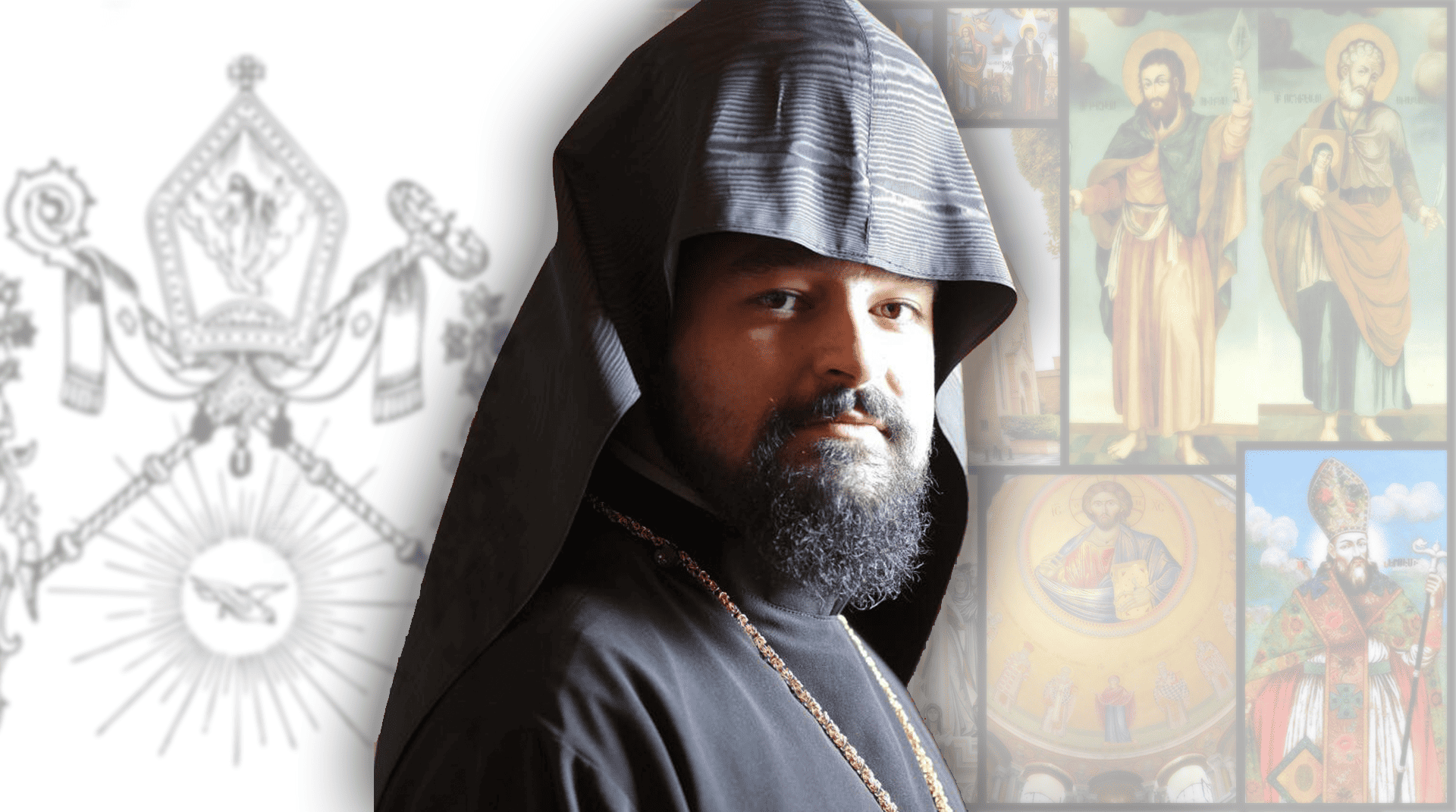Very Rev. Fr. Barouyr Shernezian, Dean of the Armenian Theological Seminary at the Holy See of Cilicia in Antelias, Lebanon, recently visited New York. Fr. Barouyr, who is pursuing a D.Min. degree at Fordham University, was interviewed by Crossroads before his flight back to Beirut.
Crossroads: Father, can you tell us a little about yourself?
Fr. Barouyr: My lay name is Haroutioun, and I was born in the district of Amanos, Lebanon. I received my primary education at Apkarian Armenian School. In 2004, I was admitted to the Seminary of the Great House of Cilicia. Following the eight-year education course at the Seminary, I graduated and was ordained a celibate priest with the name of Fr. Barouyr. After my ordination, I served as the director of the “Cilicia” museum, which allowed me to work with the manuscripts, in particular the phylacteries (հմայիլ – humayil). Simultaneously, I was also the head of the Youth Department of the Catholicosate. In 2015, I was ordained vartabed, upon which, under the high auspices of His Holiness Catholicos Aram I, I was posted to the Prelacy of the Western United States as Pastor of St. Gregory the Illuminator Church of San Francisco. At the time, I attended a theology course at Berkeley’s Graduate Theological Union and earned a master’s degree. In 2019, upon completing my pastoral duties, I returned to Lebanon and I became the director of the “Cilicia” museum again, during which period renovation work was completed. In January 2021, His Holiness appointed me Dean of the Seminary while simultaneously pursuing online the Doctor of Ministry degree at New York’s Fordham University. In this field, I am specializing in the rite of the Armenian Church, which I love to explain it to our people.
How many students and teachers are there at the Seminary?
The Seminary is blessed to have His Holiness Catholicos Aram I as headmaster and teaching theoretical and pastoral theology to the students of the last year. The Seminary has 14 priests and 14 lay teachers, who are deeply committed to educate our students . This year we have 46 students, who come from different parts of Lebanon, Syria, Armenia, and California. At the seminary they all become the children of a single family, receiving the name of seminarian.
What are the contents of the curriculum? Do you see a need for modernization?
The goal of the Seminary is to prepare our teenage and young students to serve in the future as clergy and teachers, intellectuals, and leaders in the Armenian community. Hence, in line with this objective, the goal of the curriculum is to transmit knowledge about Christian, religious, Armenian studies and history subjects. This year, our classes for the advanced students focused on the question of Artsakh, the history of the Diaspora, as well as international affairs and history of culture, to give a comprehensive formation to students as they enter Church and Armenian community life. Naturally, there is always a need for modernization, but healthy and opportune modernization is achieved over time and according to the needs of each generation.
Undoubtedly the current crisis in Lebanon impacts the work of the Seminary as well. How is that impact felt?
The economic, political, social, and health crisis of Lebanon inevitably affects every structure, the people and, naturally, the Armenian community and organizations as well. Thanks to the efforts of His Holiness, the Seminary has escaped these troubles as much as possible, but challenges and problems still exist. Electricity and gasoline shortages in particular have become a daily challenge. Individuals and friends who believe in the Seminary’s mission, however, help us with their donations to lighten the burden of these problems and allow us to continue our mission.
In its 90-year history, the Seminary has played an invaluable role in the development of the Great House of Cilicia and more generally the religious and intellectual life of the Diaspora. How do you envision that role in the future?
It is a fact that our religious, community, and cultural organizations are retreating in every community as they face powerful headwinds. In the last 90 years, the mission of the Seminary has been clearly presented to our people in almost every community. It is obvious that the graduates, be they religious or laymen, have made big contributions to the reorganization and reconfiguration of our communities. With the same devotion, the Seminary remains committed to its mission and ready to face these challenges, as well as to work at any price to stop the retreat and revitalize our communities. Today, there is a patent need of people who are ready to serve our communities with selflessness to keep our Christian faith alive and preserve our national identity and values. The Seminary is committed to that mission and continues moving forward with renewed commitment and in productive ways.

